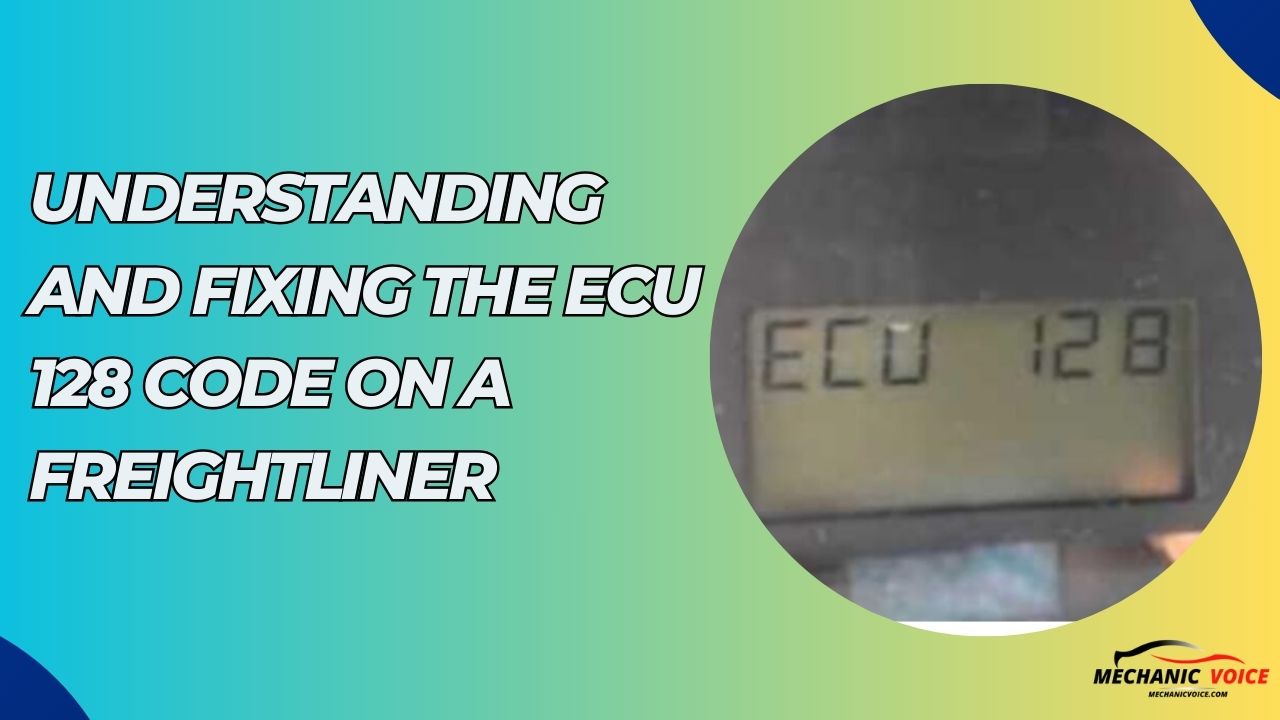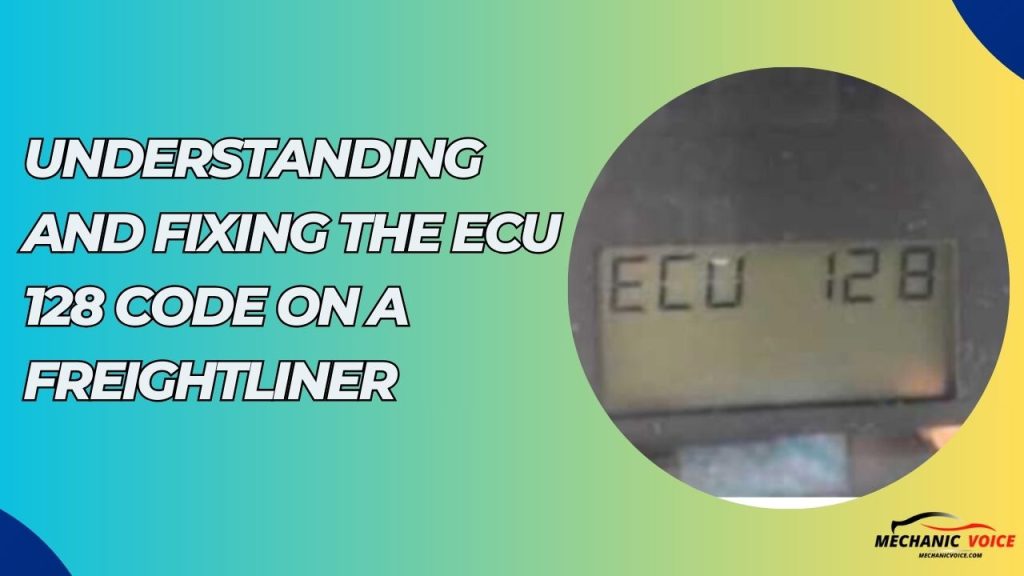Monday to Saturday - 9:00 am -18:00 pm

When I first came across the ECU 128 code on a Freightliner, I had no idea what it meant or how to fix it. If you’re reading this, chances are you’ve seen that pesky code pop up, and it’s probably causing you some stress. Don’t worry, you’re not alone – I’ve been there! The ECU, or Engine Control Unit, is a big deal in your truck. It controls a lot of important stuff under the hood, so when it starts acting up, you’ll notice it. The ECU 128 code basically means there’s a hiccup somewhere in the truck’s electronics. In this guide, I’ll walk you through what this code really means, what could be causing it, and how to fix it. I’ve been through the troubleshooting process myself, so I’m here to share everything I’ve learned to make things easier for you!
What is the ECU 128 Code?

Explanation of ECU Codes
An ECU (Electronic Control Unit) code is a diagnostic code generated by your vehicle’s onboard computer system. It helps identify issues with various components of the truck, such as the engine, transmission, or HVAC systems. These codes can be read using an OBD-II scanner and are vital for diagnosing vehicle problems efficiently.
Specific Meaning of ECU 128
The ECU 128 code specifically refers to a problem with the air conditioning system or related components in your Freightliner. It indicates that there is a fault in the communication between the ECU and the AC system, usually due to sensor malfunctions, wiring issues, or component failures.
Common Causes of ECU 128 Code on a Freightliner
Faulty Wiring Connections
One of the most common causes of the ECU 128 code is faulty or loose wiring. Over time, wires can degrade, become damaged, or even get disconnected due to mechanical wear or environmental factors. If the wiring to the AC compressor or related sensors becomes compromised, it can disrupt the normal functioning of the system and trigger the ECU 128 code.
Sensor Malfunctions
Your Freightliner’s AC system relies on a series of sensors to monitor temperature, pressure, and airflow. If one of these sensors fails, the ECU may struggle to get the right data, leading to the ECU 128 code. For example, a faulty air pressure or temperature sensor can cause the system to malfunction and trigger the error.
Compressor Issues
Problems with the AC compressor or fan clutch can also cause the ECU 128 code. The compressor is responsible for circulating refrigerant through the system, while the fan clutch regulates the airflow over the condenser. If either of these components fails, it can cause the system to stop working correctly, leading to the ECU code.
ECU Itself
In some cases, the issue could be with the ECU itself. If the ECU fails or misreads data from the sensors, it may send an incorrect error code. This type of failure typically requires more in-depth diagnosis and may involve replacing the ECU.
Read More: A Simple Guide to Honda B1 Service: What You Need to Know
Symptoms to Look For
Check Engine Light
One of the first signs that your Freightliner may have an ECU 128 code is the appearance of the check engine light on the dashboard. When the code is triggered, the ECU will alert you through the light. If the check engine light comes on without an obvious cause, it’s a good idea to run a diagnostic test to check for the ECU 128 code.
AC System Problems
The ECU 128 code is often associated with issues in the AC system. You may notice that the air conditioning isn’t working, or it may intermittently turn off or fail to cool properly. Other HVAC-related problems, such as unusual noises or fluctuating temperatures, can also point to an issue with the ECU or the components controlling the AC system.
Erratic Truck Performance
Though less common, the ECU 128 code can sometimes cause other performance issues. This might include erratic engine performance, inconsistent cooling, or problems with other electrical systems that rely on the ECU for data.
Troubleshooting and Fixing the ECU 128 Code
Step-by-Step Guide to Checking Wiring Connections
- Locate the Wires: First, locate the wiring connected to the AC system, particularly the wires near the compressor. These are the most likely to become damaged.
- Inspect for Damage: Look for any visible signs of wear, such as frayed wires or corrosion. Make sure the connections are tight and secure. If the wires are hanging loose, this could be causing a short or faulty signal to the ECU.
- Re-secure the Wires: If you find damaged or loose wires, carefully repair or replace them. You can use electrical tape or connectors to ensure the wires stay in place.
Testing and Diagnosing Sensors
- Check Sensor Connections: Inspect the sensors connected to the AC system, such as air pressure and temperature sensors. Make sure the connections are intact and free from corrosion.
- Test the Sensors: Use a multimeter to test the voltage or resistance of the sensors. If any sensors are reading outside the normal range, they may need to be replaced.
Compressor and Clutch Checks
- Inspect the AC Compressor: Check if the compressor is engaging properly. If it’s not working, it could be due to a malfunctioning clutch or electrical issue.
- Test the Fan Clutch: The fan clutch regulates airflow over the condenser. If it’s malfunctioning, it can cause the AC to stop working and trigger the ECU 128 code.
- Check for Leaks: Ensure there are no refrigerant leaks in the system, as these can also trigger errors.
Using Diagnostic Tools
- OBD-II Scanner: An OBD-II scanner can help you identify and clear the ECU 128 code. Plug the scanner into the vehicle’s diagnostic port and read the code. Some scanners may also allow you to reset the code after performing repairs.
- Reset the ECU: After fixing any wiring or sensor issues, reset the ECU using your diagnostic tool. This will clear the code and allow the ECU to recalibrate.
When to Seek Professional Help
If you’ve gone through the troubleshooting steps and the ECU 128 code persists, it may be time to consult a professional. Here are a few reasons you might need expert assistance:
- Complex Electrical Issues: If the wiring is severely damaged or you suspect a deeper electrical issue, it may require specialized tools and expertise to fix.
- Faulty ECU: If the ECU itself is malfunctioning and needs replacement, this is a job best left to professionals.
- AC Component Replacements: Replacing parts like the compressor or fan clutch might require specific knowledge of Freightliner systems.
Preventative Measures to Avoid Future ECU 128 Code Issues
Routine Maintenance Tips
- Inspect Wiring Regularly: Make sure the wiring around the AC system is in good condition and properly secured.
- Check Sensors: Regularly test sensors for proper function, especially before the start of the hot season when you’ll rely on your AC most.
- Monitor AC Components: Ensure the compressor and fan clutch are working well. Perform periodic checks to avoid unexpected failures.
Upgrading Parts
If your truck is older and has many miles on it, consider replacing old or worn-out parts before they cause problems. This can help prevent issues with sensors, compressors, and wiring from triggering codes like the ECU 128.
Keeping Diagnostics Up to Date
Running regular diagnostic tests on your Freightliner will help you spot problems early, before they develop into larger, more expensive issues. Regularly check for ECU codes and fix any issues before they escalate.
Conclusion
The ECU 128 code on your Freightliner can seem daunting, but with a bit of troubleshooting, it’s often a manageable problem. By inspecting your wiring, sensors, and AC components, you can resolve the issue and avoid costly repairs. Keep up with routine maintenance to ensure your truck’s systems stay in top condition and prevent future ECU codes from disrupting your work.
FAQ – ECU 128 Code Freightliner
1. What does the ECU 128 code mean on my Freightliner?
The ECU 128 code indicates an issue with the air conditioning system or related components in your Freightliner truck. It typically refers to a communication failure between the ECU and the AC system, often caused by faulty wiring, malfunctioning sensors, or issues with the compressor.
2. What are the common symptoms of the ECU 128 code?
Common symptoms include the check engine light illuminating on the dashboard, AC system problems such as cooling failure or intermittent operation, and potentially erratic truck performance in some cases. If your truck shows any of these symptoms, the ECU 128 code may be the cause.
3. Can I fix the ECU 128 code myself?
Yes, many truck owners can fix the ECU 128 code themselves by inspecting the wiring, sensors, and AC components. If you’re comfortable with basic diagnostics and repairs, you can check for damaged wiring, faulty sensors, or issues with the AC compressor. Using an OBD-II scanner can also help identify and clear the code.
4. How do I troubleshoot the ECU 128 code?
To troubleshoot the ECU 128 code:
- Check the wiring connections to ensure there are no loose or damaged wires.
- Inspect the sensors, especially the air pressure and temperature sensors, for malfunctions.
- Test the AC compressor and fan clutch to make sure they are functioning properly.
- Use a diagnostic tool like an OBD-II scanner to read and clear the code after performing repairs.
5. What should I do if the ECU 128 code keeps reappearing?
If the ECU 128 code keeps coming back after repairs, there might be a deeper electrical issue or a malfunctioning ECU. In this case, it’s advisable to seek professional help from a certified mechanic or Freightliner dealership to diagnose and fix the problem.
6. Can a faulty ECU cause the ECU 128 code?
Yes, in some cases, the ECU itself may be faulty and misreading or failing to properly communicate with the truck’s AC system. If you suspect the ECU is the issue, it’s best to have it professionally diagnosed and replaced if necessary.
7. How can I prevent the ECU 128 code from happening in the future?
To prevent the ECU 128 code from recurring:
- Regularly inspect the wiring and connections in the AC system.
- Check sensors and replace any that show signs of wear.
- Perform routine maintenance on the compressor and fan clutch.
- Use diagnostic tools to stay ahead of potential issues and address them early.
8. Is the ECU 128 code expensive to repair?
Repair costs can vary depending on the underlying cause of the issue. If it’s a simple wiring or sensor problem, the cost may be minimal. However, if the compressor, fan clutch, or ECU needs replacing, the costs could be higher. It’s best to diagnose the issue early to prevent costly repairs.
9. Can I drive my Freightliner with the ECU 128 code?
While you can technically drive with the ECU 128 code, it’s not recommended, especially if it’s affecting the AC or causing other performance issues. Continuing to drive with the code might lead to further damage or more costly repairs down the road. It’s better to address the issue as soon as possible.